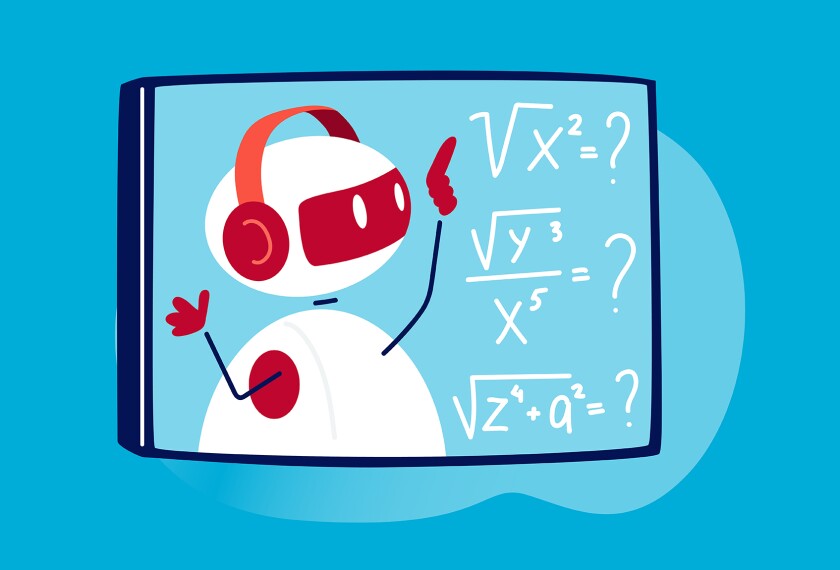Richard Culatta, the CEO of the International Society for Technology in Education, feels like a powerful moment for educational technology has arrived.
Back in 2019, the last time ISTE held its annual convention in Philadelphia, Culatta had hoped and publicly predicted that artificial intelligence and universal internet connectivity would fundamentally change learning over the next five years.
Flash forward four years. ISTE’s convention is set to start early next week in the City of Brotherly Love. And the developments he pointed to show more promise than ever, Culatta said.
Ninety percent of middle and high schools have put in place 1-to-1 computing programs, up from two-thirds prior to the pandemic, according to a March 2021 survey by the EdWeek Research Center. The percentage of elementary schools with 1-to-1 computing programs has doubled from 42 percent to 84 percent. And generative AI—in the form of ChatGPT and other tools—is now top of mind in K-12 education.

So how is one of the largest ed-tech conferences in the world hoping to address the current moment in K-12 education? And what changes can educators expect to ISTE itself as it merges with ASCD, one of the oldest and largest K-12 professional development associations?
In a Zoom interview, Education Week asked Culatta those and other questions. Below are highlights from the conversation, edited for length and clarity.
Schools now have close to universal internet connectivity and AI is moving into classrooms. What challenges and opportunities does the combination of those two trends bring?
It’s like the ball is back in our court. So for educators for a long time, it was easy to say “wow, if I just had connectivity, I would do great things with it.” Or “someday if AI actually shows up, we could do cool things.”
Now we need to step up and say, “What are we doing that’s really transformational here?” There’s no longer an excuse to be scanning and uploading worksheets. We have a set of tools that we got largely because of the pandemic. The clock is ticking. The world is looking at us to say, “alright, you got all the technology you’ve been asking for all these years. Show us the magic.” And in some cases, we’re seeing magic, and in other cases there’s not a lot of magic. This is a chance for us to step up and really show what it can look like when we use technology in really powerful ways.
AI is obviously hot right now. But educators are more likely to see it as a negative force for schools than a positive one. What’s ISTE’s overall message on AI at this moment in time?
Our message is going to be that the education community is largely focusing on the wrong things. We’re really hyped up around things like cheating. But, actually, if you’re worried about cheating, the problem is you’re assessing [the wrong things.]
These tools are being built very quickly. And my goal is I want to see educator fingerprints all over them. There are some educators that I’ve literally heard them say things like, “you know, we’re gonna sit this one out, right, we’re gonna sit this one out, we’ll catch up. We’ll wait till AI gets developed a bit more.” That is the absolute wrong approach.
What should students should be learning in the era of ChatGPT?
The whole school model has been set up on this idea of we tell kids a thing, and then [gauge their ability] to tell us back that thing as closely as possible. How valuable is that? There’s some real fundamental questions that we have to ask around: What is the purpose of school moving forward? And that’s the conversation that I very much hope to have at the conference and beyond.
Any topics you’re particularly excited about?
Over the last year, we had a team that’s been working with our educators to curate some of the best tools for learning. And we’ve actually created like a [VR experience] that will run through the whole conference.
VR was overhyped at the beginning. I think that allowed people to write it off. Really powerful learning experiences can happen in VR. No, we’re not going to sit in VR all day, every day. Nobody wants that. But there are some really interesting experiences that VR allows that [are hard to pull off in real life.]
I think we’re in a moment where we need lots of creativity and learning. So for example, one of our [ISTE experiences] is going to be around art and technology, and how we can really think about technologies for the creative side of learning not just like drilling on how to divide fractions or whatever.
Where does the merger between ISTE and ASCD stand? Will there be a new name for the combined organizations?
We have some finalist names in legal review. It will be [unveiled] sometime later this summer. We’re looking for a name that is inspiring and feels like what we want to be, which is an organization of educators who are trying to inspire the future of learning.






